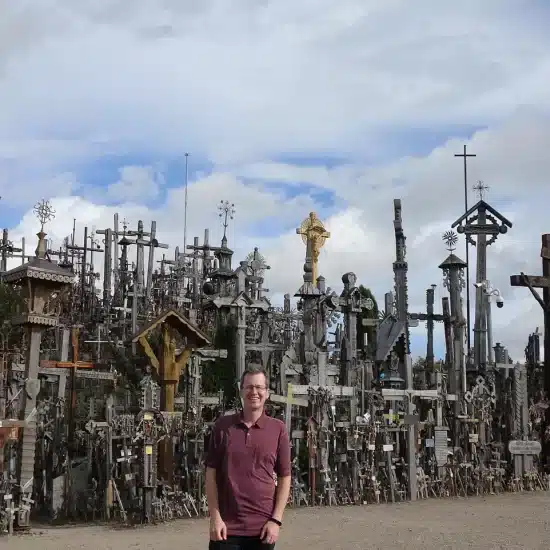By Bill Webb
Word&Way Editor
Ever play a game of whatever happened to (fill in the blank)? It is hard to lose track of major players in an event that occurred several years ago, but not so with the secondary actors. We may not remember their names; we may not have known their names at the time, but they figured into something memorable.
 The passion of Christ — His steadfast march to Calvary and crucifixion — was replete with relative nobodies who found their way into the Bible as bit characters to the drama of Christ and the cross. Most are never mentioned again after the resurrection. Ever wonder what happened to them?
The passion of Christ — His steadfast march to Calvary and crucifixion — was replete with relative nobodies who found their way into the Bible as bit characters to the drama of Christ and the cross. Most are never mentioned again after the resurrection. Ever wonder what happened to them?
A good-sized group of these people were the palm-wavers — we might also call them salvation-seekers, with their enthusiastic chants of “Hosanna.” They were hopeful that they could get something from Jesus, but most of them turned on him when the larger crowd became ugly and called for His execution.
Whatever happened to these people, enthusiastically supportive of Jesus one moment and enthusiastically calling for His death in another? Did any of these salvation-seekers come around on the other side of the cross to find what they were seeking in the first place?
What about the individuals players?
Poor Simon of Cyrene, in town for the religious holiday, was literally pulled into the crucifixion processional. Simon may have been dressed in his finest Passover robe when a soldier thrust him toward Jesus with orders to help shoulder a rugged cross, already blood-stained from Jesus’ repeated beatings. Perhaps Simon was the obvious choice for unpleasant forced labor, being a foreigner and a person of color.
Did Simon finish his cross-bearing and skedaddle as fast he could from Golgotha? Did he perhaps hang around Jerusalem? Was he around when stories of Jesus’ resurrection began to circulate? Did Jesus say anything to Simon as the two walked the tortuous path to the site of execution? Did Simon’s brush with Christ ultimately result in his own salvation or merely leave him with chilling nightmares?
Many readers of the Bible have surely wondered about the centurion charged with guarding Jesus. Perhaps crucifixions had become routine to this seasoned Roman commander. He probably thought he had seen it all until unnatural events began to happen simultaneously on this particular day.
Things normally settled down once a prisoner died. But in Jerusalem, strange and terrifying things began to happen as soon as Jesus “gave up His spirit.” The impenetrable curtain in the temple ripped from top to bottom; the earth shook and rocks split into pieces; and tombs broke open and deceased “holy people” came to life and walked the streets.
Matthew indicates that when the centurion and his men saw what was happening around them, they became terrified and exclaimed, “Surely He was the Son of God.” The centurion did not have to connect these terrifying events to Jesus, but he did. The disciples said the same words when Jesus quieted the sea after they feared they might drown at sea.
Was the centurion merely affirming whom he believed Jesus to be, or did he become an actual follower? We have accounts of members of the Roman emperor’s household becoming believers. The Bible does not tell us what became of this man, who not only saw terrifying things but saw how Jesus died and heard his brief words on the cross.
There were others — the guards who took bribes from the chief priests for saying grave-robbers stole the body when they fell asleep on the job and religious leaders who sought Jesus’ undoing. How many of them were later drawn to Jesus?
We don’t know if Simon, the centurion, any of the guards or some of the church leaders ever came to Jesus. We do know that a crucified thief went to heaven. And we know that God thought people of various racial and ethnic backgrounds, Roman soldiers, religious office-holders and salvation-seekers from various walks of life made good prospects for His church.
Even as He made his way to the cross, Jesus reached out to people most of us would regard as unlikely prospects for a faith relationship, including a petty Roman governor named Pilate. Even today, the single qualification for coming to Christ is to be a sinner.
At Easter, Christ’s followers honor Him by remembering His sacrifice and His victory over death. We recommit ourselves to make His name and His will known among everyone. If you are still on the outside, there’s room at the cross for you, too. Come today.

